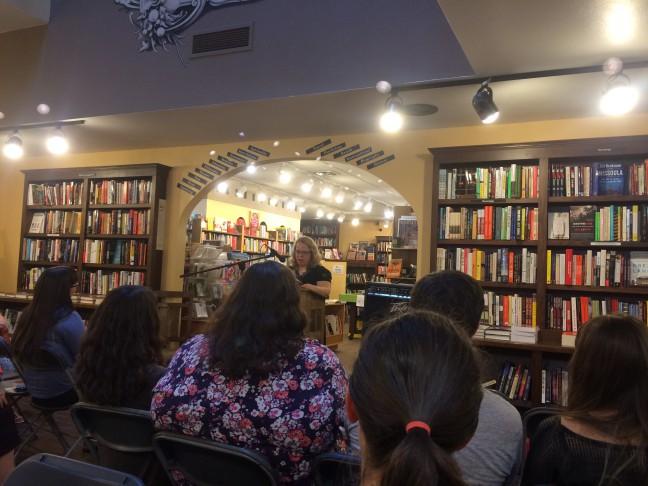Kate Harding, author of the new book “Asking for It,” took on rape culture in a reading and question-answer session at A Room of One’s Own bookstore Thursday night.
“Asking For It” made its debut on the stands in early August and Harding has been traveling to cities including New York, Texas and now Madison to not only promote the book, but educate communities on rape culture and its effects.
The majority of the chairs at the session were occupied, bringing a diverse crowd: a mix of races, genders and ages were all represented.
Harding’s reading focused around a story that highlights the way women are forced to constantly consider safety in everyday life.
“If we get assaulted while walking alone in the dark, we are told that we should have used our heads and anticipated the danger,” Harding read. “But if we are honest about the amount of mental real estate we devote to anticipating danger, we are told we are man-haters.”

Kiyoko Reidy/The Badger Herald
Harding presented several ideas on how to combat the rape culture present in society.
Educating children before they become sexually active, talking more about sexual assault and putting legal affirmative consent models in place are key ways to help diminish the prevalence of rape, Harding said. Affirmative consent models, which are already being instituted in California colleges, require a firm “yes” from participants in sexual activity, instead of simply the absence of a “no.”
In order to decrease the prevalence of rapes, Harding said society needs to stop telling women to protect themselves from rape, and instead tell men to stop raping. Harding described her personal experience of being raped in college, saying she received help from the school, but the school declared after an investigation that the man she had accused was not the one who raped her.
“There seem to be survivors, but no perpetrators,” Harding said. “It’s not that we don’t want to acknowledge that women were raped, its that we don’t want to think that men rape.”
Ruanda McFerren, a graduate student at the University of Wisconsin, picked up a copy of the book after attending the talk. McFerren decided to attend the talk because she believes being aware of rape culture is important as a woman.
McFerren said she had never thought of rape as a “perpetrator-less” crime, but recalls witnessing victim-shaming in the past — something she hopes to help prevent in the future.
Creating an environment that does not just view rape in the legal sense, but also strongly objects to it morally is crucial in ending rape culture, Harding said.
“Don’t think: ‘How close can I get to the rape line?’ but instead: ‘How sure can I be that everyone involved in this sexual encounter is completely into it?’” Harding said.


